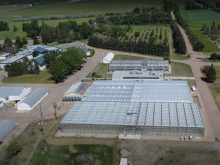The ruling Saskatchewan Party says it is not to blame for picking favourites in the hog industry.
Saskatchewan enterprise and innovation minister Lyle Stewart said his government is extending a $3.7 million loan to help keep the province’s largest hog operation afloat, but it was the former NDP government that made the initial investment in Big Sky Farms Inc.
“We think this is clearly an investment that was foolish,” he said.
“We don’t think the government should have been picking winners and losers and we certainly don’t think that there was ever any appetite among the public to be a majority shareholder of any company, much less one as risky and cyclical as a hog company.”
Read Also

Alberta crop diversification centres receive funding
$5.2 million of provincial funding pumped into crop diversity research centres
Staff of NDP opposition leader and former premier Lorne Calvert were contacted, but said Calvert was unavailable for comment.
According to Investment Saskatchewan’s 2007 annual report, the province has a 62.9 percent ownership in Big Sky valued at $30.5 million, $15 million less than it was worth at the end of 2006.
Stewart said the province wants out of the hog business but now is not a good time to be looking for a buyer.
The government is protecting its investment in Big Sky until the hog cycle turns around and it can get better value for its asset.
The minister empathized with other hog producers who are disturbed that they have been forced out of business while their competition gets a loan.
“We recognize and understand why producers who have been operating on their own hook are bitter about it. I don’t blame them,” he said.
Vaughn Crone, a producer from Moose Jaw, Sask., who in March shipped the last pigs from what was once a thriving 400 sow farrow-to-finish operation, can’t understand why the NDP chose to invest in Florian Possberg’s operation and nobody else’s.
“Why him? What made him more special than me?”
He said the only reason Big Sky continues to survive is because the government is bailing the company out with a $3.7 million loan.
“You and I are paying the bill,” said Crone.
He thinks a number of smaller operations could have been salvaged had that $3.7 million been divvied up.
“Boy, what a couple hundred thousand dollars would have done for some of these other smaller guys,” said Crone.
Possberg said more taxpayer money is going into smaller operations on a per hog basis than Big Sky receives due to caps on federal and provincial programs.
And he balked at the suggestion of political favouritism. He said all shareholders in Big Sky need to “pony up” during these difficult times and the $3.7 million loan from Investment Saskatchewan is a management decision, not a political one.
In fact, one of the big challenges facing Big Sky going forward is that the province wants out, which means the other shareholders must somehow find the means to buy out their business partner.
The good news is the market is starting to turn the corner. The SPI price for index 100 hogs for the week ending April 25 was $126.50 per 100 kilograms, up from the March 24 low of $92.50.
“The market is going to adjust and hopefully Saskatchewan and Canada can keep as many of their efficient producers as possible,” said Possberg.
He is confident the firm he founded is going to be one of the survivors.
“Absolutely. No question.”















